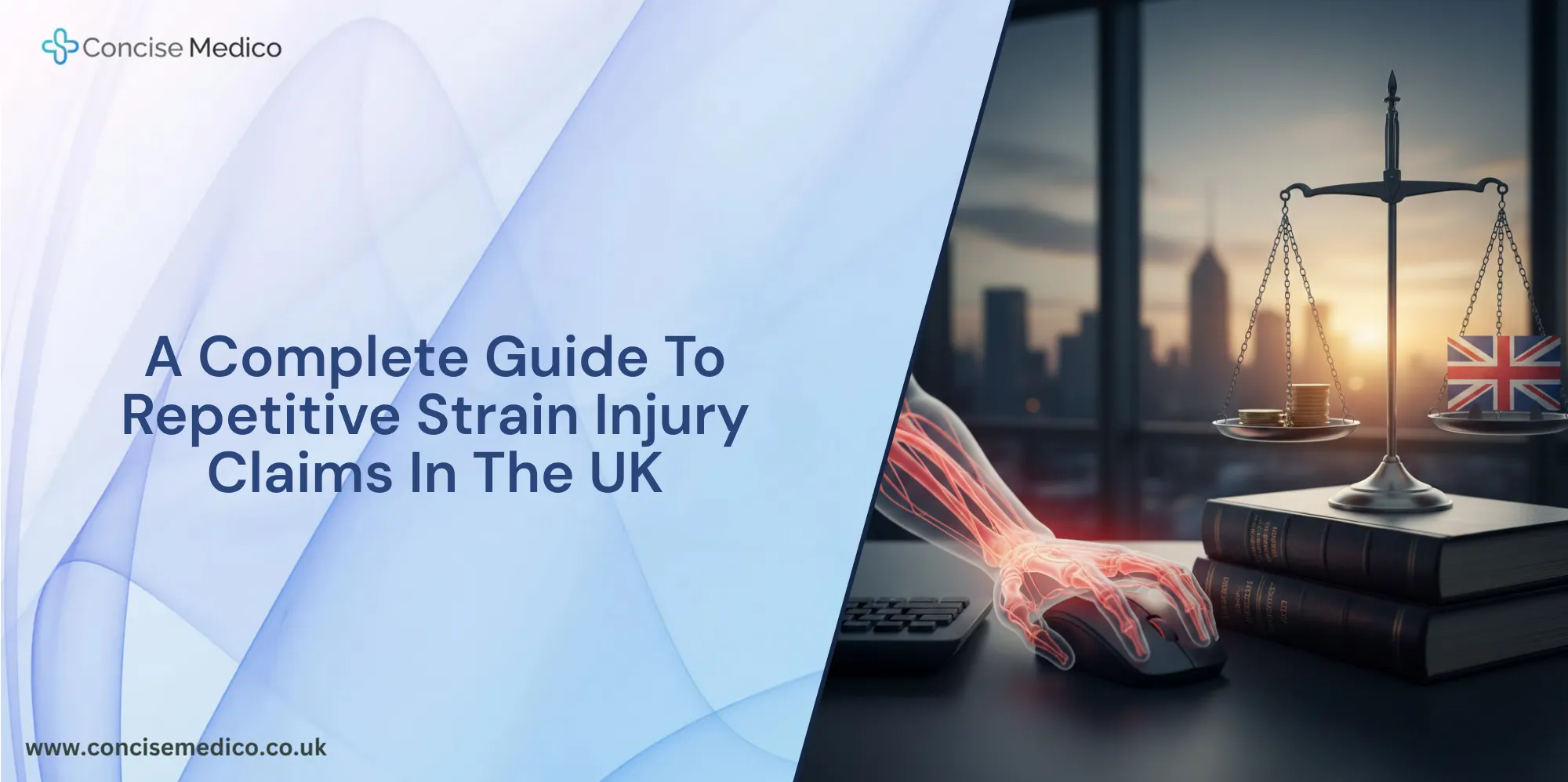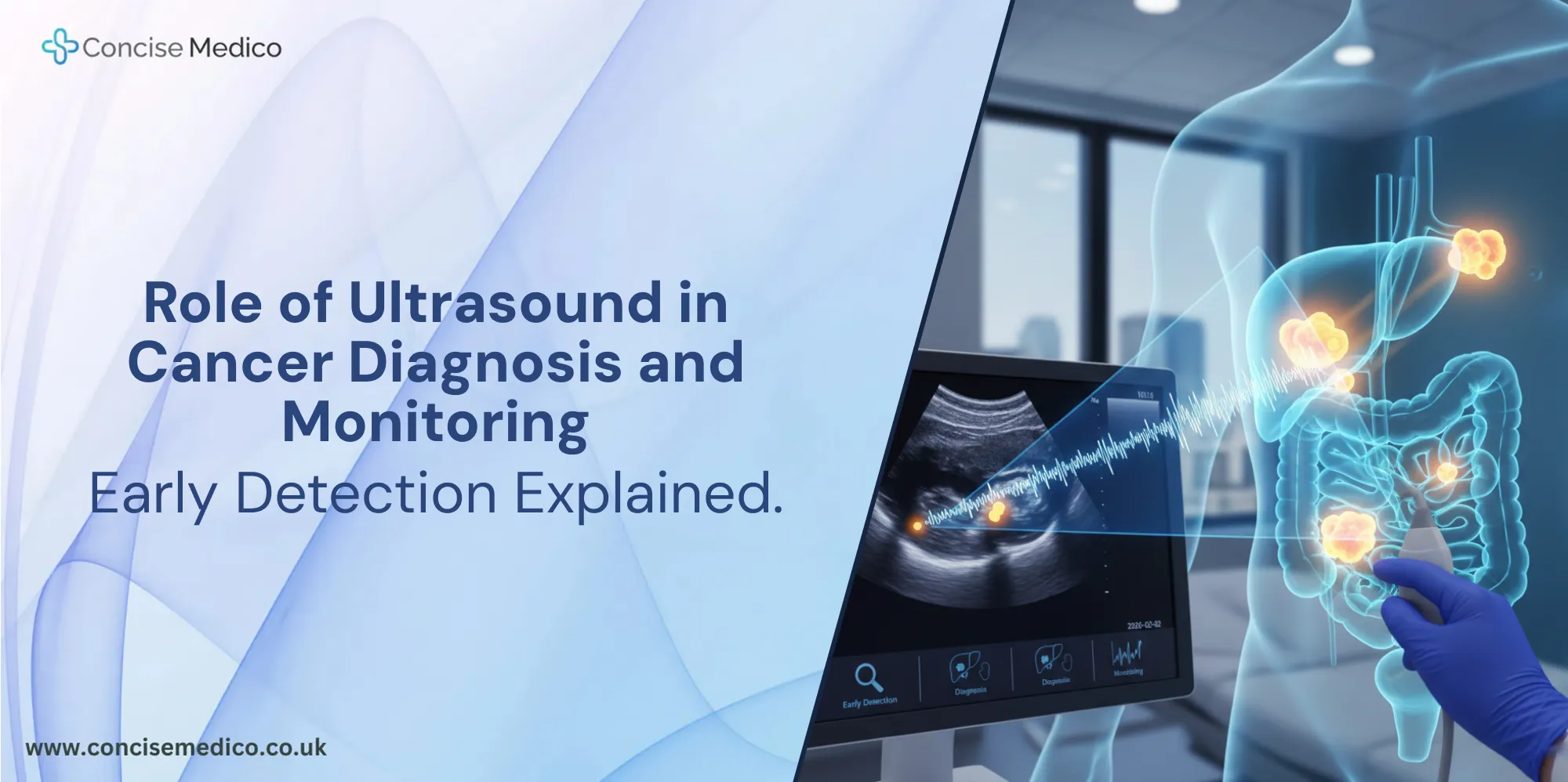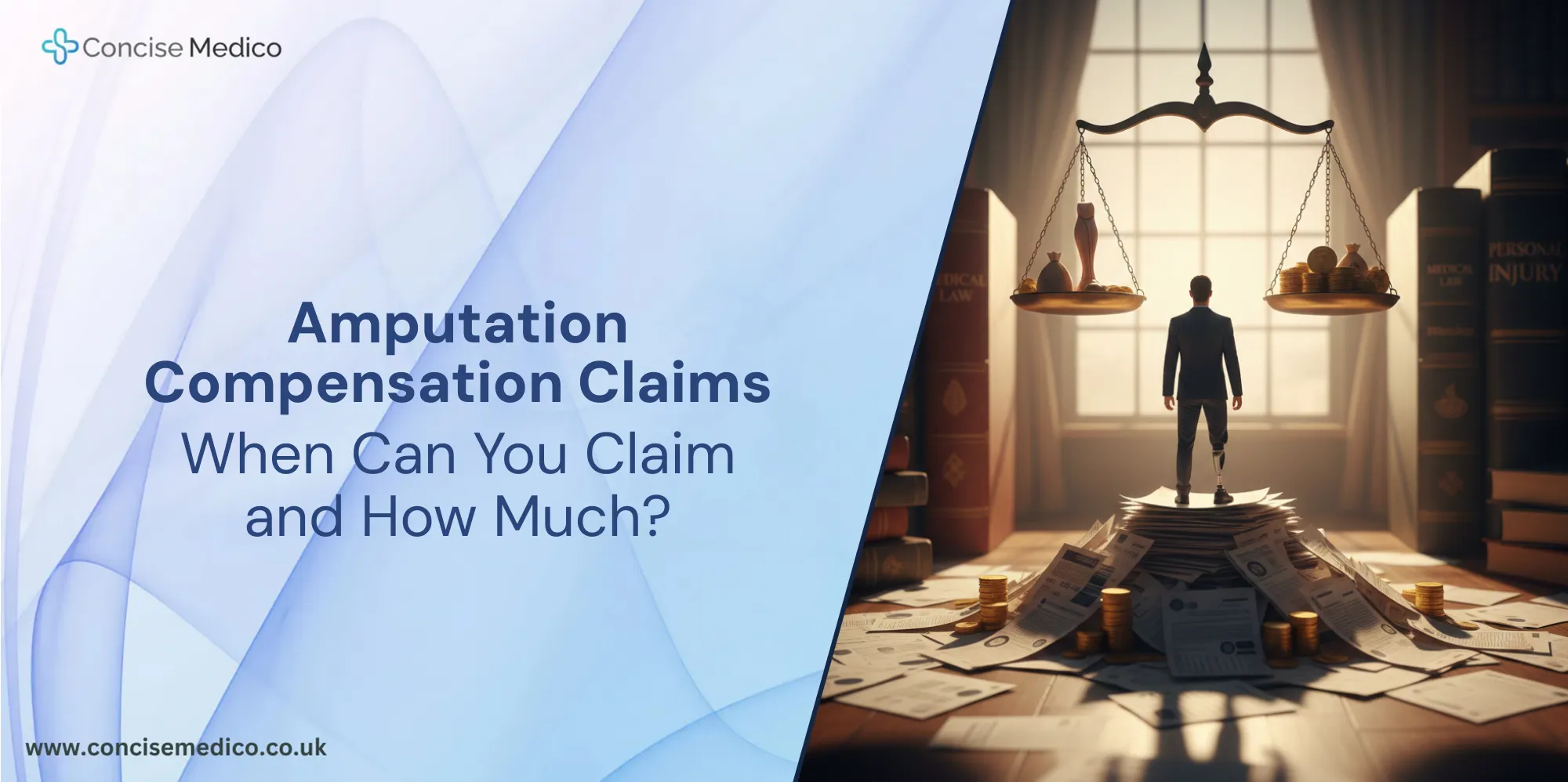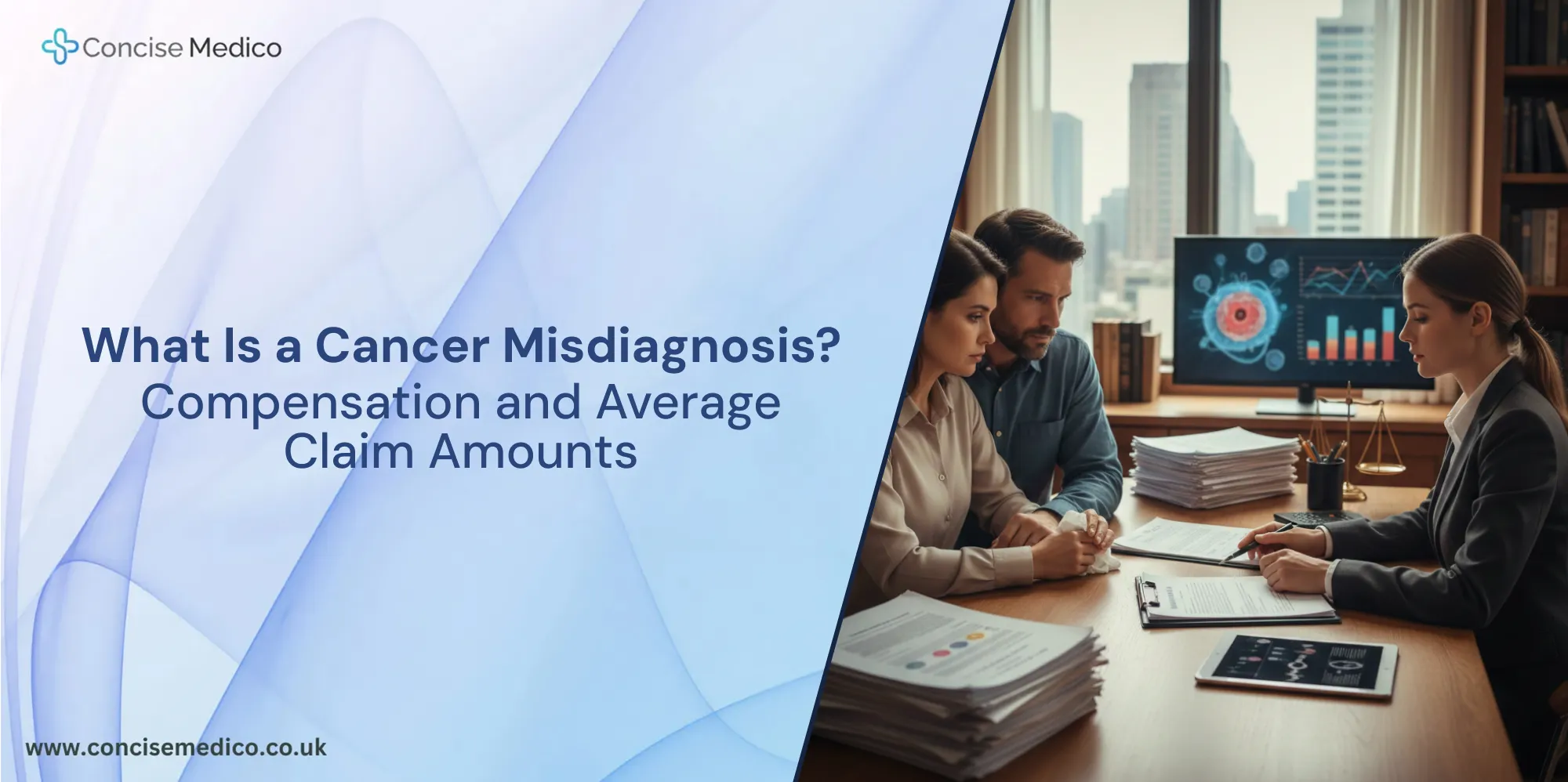TABLE OF CONTENT
- What Is Psychiatrist Expert Evidence?
- When Is Expert Evidence in Court Used?
- The Role of Expert Witness Psychiatrists in the UK
- What Happens During Psychiatric Evaluations?
- The Legal Duty of the Expert Witness Psychiatrist
- Real Court Impact of Psychiatrist Expert Evidence
- Recent Trends in Expert Evidence in Court
- Challenges in Psychiatric Expert Testimony
- How to Choose the Right Expert Witness Psychiatrist
- The Vital Role of Psychiatrists in Expert Evidence for Court
- Contact Us Today
- FAQs
Legal cases often include more than just facts and figures. When mental health becomes a concern, courts rely on psychiatrist expert evidence to gain deeper insight. These experts check a person’s mental state. They share their findings in reports or during live testimony.
Known as expert witness psychiatrists, they provide trusted expert evidence in court. Their input helps judges and juries decide fairly. They do this by using psychological evaluations.
What Is Psychiatrist Expert Evidence?
Psychiatrist expert evidence means a mental health doctor gives an opinion in a legal case. They do not treat the person but check their mental state. To form this opinion, the doctor talks with the person, uses tests of thinking and mood, and reviews past medical records. Then they write a report or speak in court as an expert witness. Courts use this information to decide things such as whether someone can take part in a trial, if they were of sound mind when a crime happened. Their work is based on evidence. This includes interviews, tests, and past medical records. They often submit reports or appear in court as a psychiatrist expert witness.
When Is Expert Evidence in Court Used?
1. Criminal Law
In criminal cases, an expert witness is essential. They assess:
- If someone is mentally fit to stand trial
- If a person was sane when a crime was committed
- They understand the legal process
This is essential since mental health conditions are a pressing issue in the judicial process. UK Ministry Justice data shows over 82% of women prisoners compared with just over half of men 59% in have mental health issues. Majority faces problems like depression, schizophrenia, or personality disorders.
Sometimes, people might claim “diminished responsibility.” This means they are not fully aware or in control during the offense. In these cases, the court looks at report or proof from psychiatrists to find the truth.
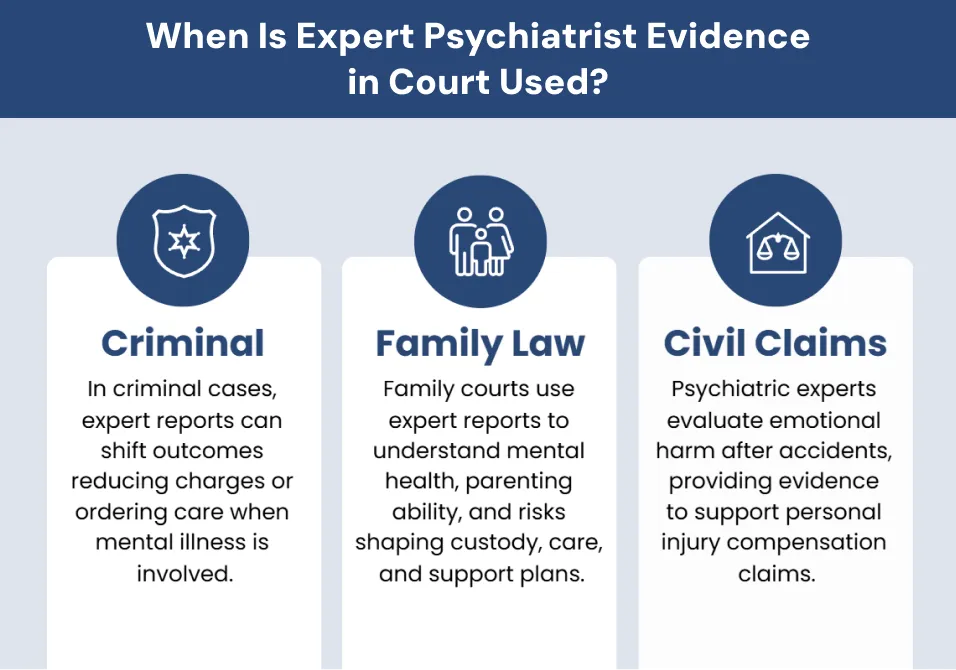
The findings from these reports can shape what happens next in court. These reports can lead to:
- Charges being lowered if a mental health problem played a role in the crime
- A court ordering mental health care instead of sending someone to prison
- Better public safety because the person gets the help they need
A psychiatrist expert witness helps ensure justice is fair and looks at all factors.
R v Byrne (1960) Case
In this case, a man strangled and mutilated a young woman. Doctors found he had a severe mental disorder that warped his control over violent urges. The court accepted their testimony, ruling that his abnormal mind state lessened his blame. This decision shaped how courts view diminished responsibility, requiring clear medical proof of mental disturbance to reduce murder to manslaughter if control over actions was impaired.
Read more about insanity defence.
2. Family Law
Family courts need clear mental health views when parents fight over child custody. A psychiatrist expert witness meets parents and children to see how they get along. They use simple tools to check mood and thinking. This psychiatrist expert evidence shows if issues like depression or anxiety could make care hard. Sometimes the expert visits the home or talks with teachers and doctors. The report helps judges know if a parent is a risk or if a child may struggle with divorce. With this expert evidence in court, judges make custody plans, pick who cares for the child, and set up support like therapy so families can heal.
3. Civil Law and Injury Claims
In personal injury claims, psychiatric evaluations show how trauma affects someone’s mind. Experts look for signs of depression, anxiety, or PTSD after an accident. A psychiatrist expert evidence report becomes part of expert evidence in court to support compensation claims. An expert witness psychiatrist uses tests and interviews to measure emotional harm and present clear findings.
The Role of Expert Witness Psychiatrists in the UK
The UK legal system values professional input. According to the Royal College of Psychiatrists:
“The expert must be able to provide impartial, unbiased, objective evidence on the matters within their field of expertise. This is reinforced by Rule 19.2 of the Criminal Procedure Rules which provides that an expert has an overriding duty to give opinion evidence which is objective and unbiased.”
CPS.GOV.UK
This ensures that expert evidence in court is reliable and respected.
Who Needs Psychiatric Expert Evidence?
-
Lawyers
Lawyers need clear mental health facts to build a strong case. They rely on expert reports to show how a person’s mind works. This evidence can help them argue for fair treatment in court. With expert input, lawyers can explain complex issues in simple terms.
-
Judges
Judges use expert evidence to learn about mental health in a case. They must understand if someone’s behavior links to a condition. This helps them make fair decisions. Expert input makes medical facts clear and easy to follow.
-
Clients
Clients benefit when experts clearly explain their mental state. This shows the court what they truly feel and think. Honest reports can lead to better support and outcomes. Clients feel heard when experts share their real story.
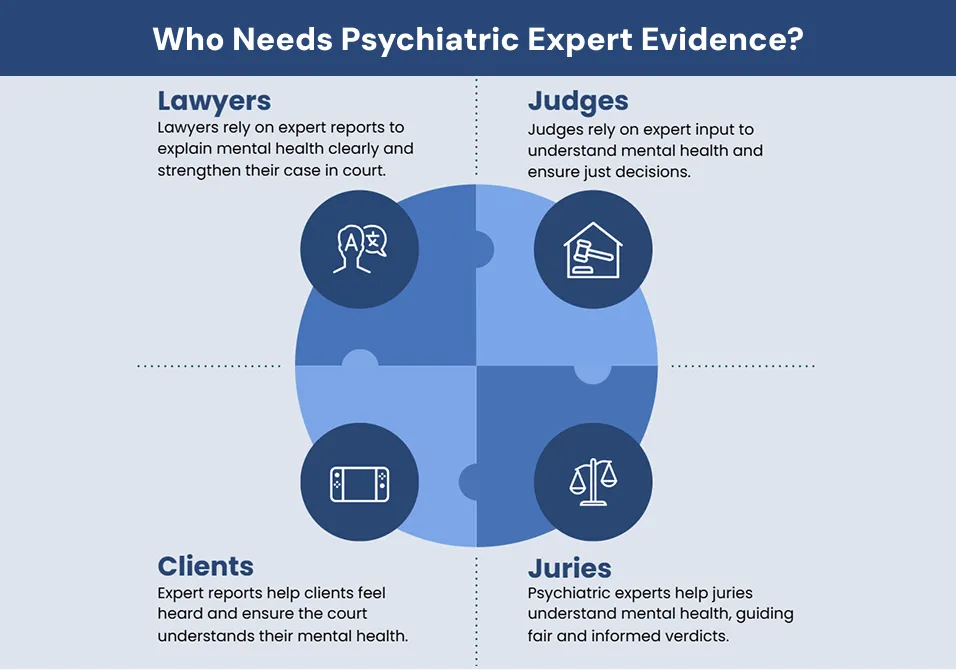
-
Juries
Juries need clear testimony to decide a case. A psychiatrist expert witness uses plain words to explain mental health findings. Jurors also get the expert’s written reports and any test results as proof, so they can see how a person’s mental state affected their actions. This helps jurors weigh the evidence and reach a fair verdict.
What Happens During Psychiatric Evaluations?
A psychiatric evaluation takes a close look at your mind, not just a normal therapy talk. First, the expert witness speaks with you to learn how you’ve been feeling. They also review your past medical records to understand any previous issues. Then, they run simple tests to check your thinking, memory, and decision-making skills. All this helps paint a clear picture of your emotions, thoughts, and how well you process information.
The Legal Duty of the Expert Witness Psychiatrist
A psychiatrist expert witness must be unbiased. Their role is not to help one side win. Instead, they must:
- Stay neutral
- Follow the rules of legal procedure
- Use only facts and proven medical data
They must be registered and licensed. The court trusts them because they base their opinions on facts, not guesses.
Real Court Impact of Psychiatrist Expert Evidence
Here’s how expert evidence can change a case:
A. Reduced Sentences for Treatment
When someone’s mental state plays a big part in a crime, judges can choose a lighter sentence. A psychiatrist expert evidence report may show that treatment in a hospital is better than prison. This allows the court to focus on healing instead of just punishment. An expert witness psychiatrist will explain how therapy can help the person become stable again. This way, the sentence can be reduced and aim for recovery and public safety.
B. Custody Cases
In disputes over child care, the more emotionally steady parent often gains custody. A report from a psychiatrist expert evidence review helps the judge see who can best support the child. It looks at each parent’s ability to handle stress and cater the child’s needs. An expert witness psychiatrist will share observations about parenting skills and emotional health. These findings guide the court to make a choice that supports the child’s well-being.
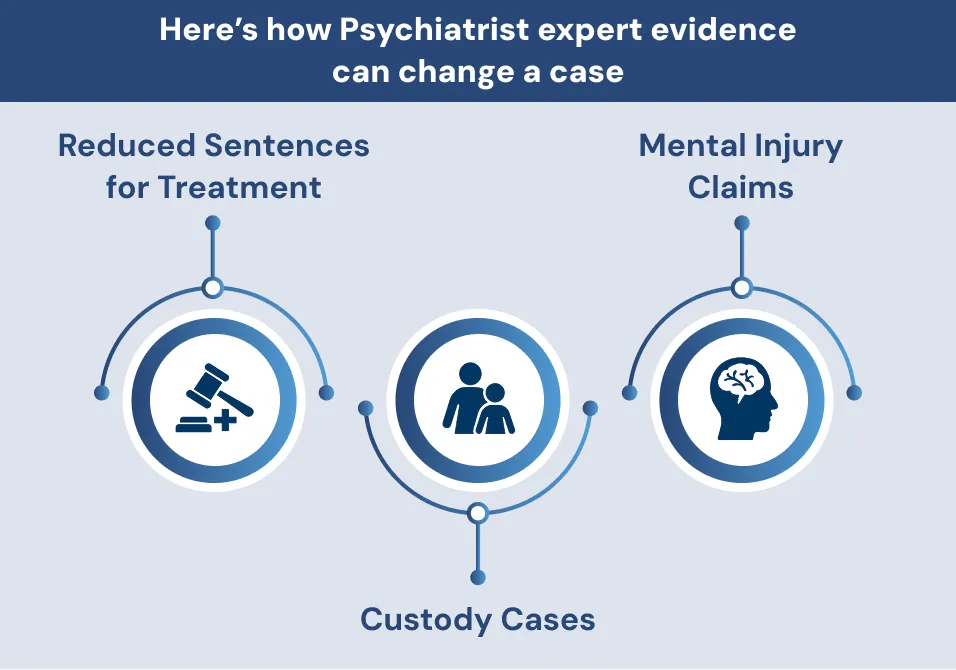
C. Mental Injury Claims
When someone suffers mental trauma after an accident, they need fair compensation. Courts use reports from psychiatric evaluations to see how much harm was done. A psychiatrist expert evidence review can show if a person has depression, anxiety, or PTSD. An expert witness psychiatrist presents these findings clearly, so the judge or jury understands. This helps set the right amount of money for recovery and future care.
Recent Trends in Expert Evidence in Court
Courts now gather mental health info in new ways. Judges accept remote video checks, making it easier for people in far-off places. Experts must use secure tools so reports stay private and accurate.
-
Telemedicine
Courts now allow video sessions to collect psychiatrist expert evidence from remote locations. Experts use secure apps to protect privacy and give clear psychiatrist expert evidence that judges trust. This approach also reduces wait times, and cases move forward faster.
-
New Mental Health Disorders
Experts now deal with newer issues, like:
-
Digital addiction
People may use devices so much that sleep and work suffer. Simple quizzes help spot problems. This gives psychiatrist expert evidence to show how screen time affects daily life. Monitoring changes over weeks helps experts see if habits are improving.
-
Trauma from online abuse
People may use devices so much that sleep and work suffer. Simple quizzes help spot problems. This gives psychiatrist expert evidence to show how screen time affects daily life. Monitoring changes over weeks helps experts see if habits are improving.
-
Long COVID mental effects
Harassment on social media can cause lasting stress. Psychiatrists look for signs like constant worry or mood swings. They track how these feelings affect daily routines and relationships.
These newer topics are now included in psychiatrist expert evidence.
Challenges in Psychiatric Expert Testimony
Giving mental health facts in court can be hard. A psychiatrist expert evidence report must be clear and fair. Sometimes people do not trust the expert if they seem one-sided. It takes time to explain complex ideas in simple words so everyone can follow.
-
Bias Risk
An expert might favour one side in a case, and that can raise questions. If people think the witness is not neutral, they doubt the facts. A psychiatrist expert evidence report must show care to be fair. Experts work hard to keep their views balanced and honest.
-
Complex Language
Mental health terms can be tricky for non-experts to grasp. Reports should use simple words so judges and juries do not get lost. A psychiatrist expert evidence report must avoid big medical jargon. Keeping it plain helps everyone see what is truly at stake.
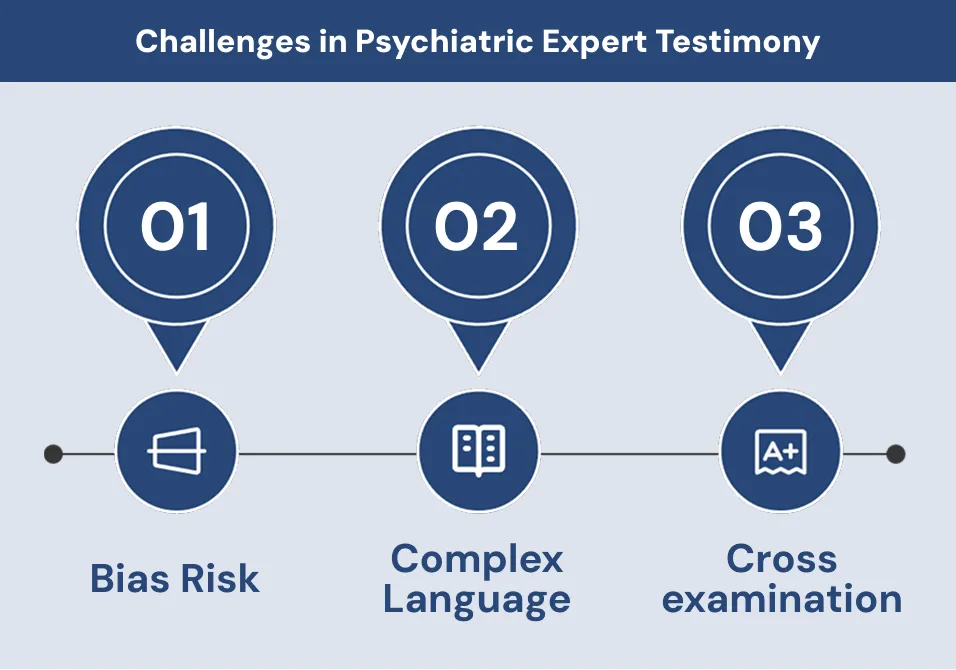
-
Cross-examination
In court, lawyers ask tough questions to test the expert’s report. The expert must stand by every word they wrote or said. A psychiatrist expert evidence report must be backed by facts and clear logic. If the expert wavers, their whole testimony can lose its value.
They must stay calm, use plain words, and give examples to support their views.
when experts share their real story.
Clear and honest mental health input helps everyone.
How to Choose the Right Expert Witness Psychiatrist
When selecting an expert witness, look for:
- Licenced UK practitioners
- Expertise in court protocols
- Good talking skills
- Knowledge of recent mental health trends
Concise Medico helps law firms and people find trusted experts. They also offer full mental assessments for court use.
The Vital Role of Psychiatrists in Expert Evidence for Court
Psychiatrist expert evidence is essential in today’s legal world. A trained psychiatrist expert witness can greatly impact cases. This covers mental illness in crimes and emotional harm in civil cases.
Their work helps bring fairness to the courtroom. They turn medical facts into clear insights. And they help judges and juries make informed choices.
To get reliable expert evidence, trust only licensed, experienced, and neutral experts.
Contact Us Today
Need help from a trusted expert witness in the UK? Reach out to Concise Medico. Our team gives thorough psychiatric assessments and fast court reports.
FAQs
Legal cases often include more than just facts and figures. When mental health becomes a concern, courts rely on psychiatrist expert evidence to gain deeper insight. These experts check a person’s mental state. They share their findings in reports or during live testimony.
Known as expert witness psychiatrists, they provide trusted expert evidence in court. Their input helps judges and juries decide fairly. They do this by using psychological evaluations.
What Is Psychiatrist Expert Evidence?
Psychiatrist expert evidence means a mental health doctor gives an opinion in a legal case. They do not treat the person but check their mental state. To form this opinion, the doctor talks with the person, uses tests of thinking and mood, and reviews past medical records. Then they write a report or speak in court as an expert witness. Courts use this information to decide things such as whether someone can take part in a trial, if they were of sound mind when a crime happened. Their work is based on evidence. This includes interviews, tests, and past medical records. They often submit reports or appear in court as a psychiatrist expert witness.
When Is Expert Evidence in Court Used?
1. Criminal Law
In criminal cases, an expert witness is essential. They assess:
- If someone is mentally fit to stand trial
- If a person was sane when a crime was committed
- They understand the legal process
This is essential since mental health conditions are a pressing issue in the judicial process. UK Ministry Justice data shows over 82% of women prisoners compared with just over half of men 59% in have mental health issues. Majority faces problems like depression, schizophrenia, or personality disorders.
Sometimes, people might claim “diminished responsibility.” This means they are not fully aware or in control during the offense. In these cases, the court looks at report or proof from psychiatrists to find the truth.

The findings from these reports can shape what happens next in court. These reports can lead to:
- Charges being lowered if a mental health problem played a role in the crime
- A court ordering mental health care instead of sending someone to prison
- Better public safety because the person gets the help they need
A psychiatrist expert witness helps ensure justice is fair and looks at all factors.
R v Byrne (1960) Case
In this case, a man strangled and mutilated a young woman. Doctors found he had a severe mental disorder that warped his control over violent urges. The court accepted their testimony, ruling that his abnormal mind state lessened his blame. This decision shaped how courts view diminished responsibility, requiring clear medical proof of mental disturbance to reduce murder to manslaughter if control over actions was impaired.
Read more about insanity defence.
2. Family Law
Family courts need clear mental health views when parents fight over child custody. A psychiatrist expert witness meets parents and children to see how they get along. They use simple tools to check mood and thinking. This psychiatrist expert evidence shows if issues like depression or anxiety could make care hard. Sometimes the expert visits the home or talks with teachers and doctors. The report helps judges know if a parent is a risk or if a child may struggle with divorce. With this expert evidence in court, judges make custody plans, pick who cares for the child, and set up support like therapy so families can heal.
3. Civil Law and Injury Claims
In personal injury claims, psychiatric evaluations show how trauma affects someone’s mind. Experts look for signs of depression, anxiety, or PTSD after an accident. A psychiatrist expert evidence report becomes part of expert evidence in court to support compensation claims. An expert witness psychiatrist uses tests and interviews to measure emotional harm and present clear findings.
The Role of Expert Witness Psychiatrists in the UK
The UK legal system values professional input. According to the Royal College of Psychiatrists:
“The expert must be able to provide impartial, unbiased, objective evidence on the matters within their field of expertise. This is reinforced by Rule 19.2 of the Criminal Procedure Rules which provides that an expert has an overriding duty to give opinion evidence which is objective and unbiased.”
CPS.GOV.UK
This ensures that expert evidence in court is reliable and respected.
Who Needs Psychiatric Expert Evidence?
-
Lawyers
Lawyers need clear mental health facts to build a strong case. They rely on expert reports to show how a person’s mind works. This evidence can help them argue for fair treatment in court. With expert input, lawyers can explain complex issues in simple terms.
-
Judges
Judges use expert evidence to learn about mental health in a case. They must understand if someone’s behavior links to a condition. This helps them make fair decisions. Expert input makes medical facts clear and easy to follow.
-
Clients
Clients benefit when experts clearly explain their mental state. This shows the court what they truly feel and think. Honest reports can lead to better support and outcomes. Clients feel heard when experts share their real story.

-
Juries
Juries need clear testimony to decide a case. A psychiatrist expert witness uses plain words to explain mental health findings. Jurors also get the expert’s written reports and any test results as proof, so they can see how a person’s mental state affected their actions. This helps jurors weigh the evidence and reach a fair verdict.
What Happens During Psychiatric Evaluations?
A psychiatric evaluation takes a close look at your mind, not just a normal therapy talk. First, the expert witness speaks with you to learn how you’ve been feeling. They also review your past medical records to understand any previous issues. Then, they run simple tests to check your thinking, memory, and decision-making skills. All this helps paint a clear picture of your emotions, thoughts, and how well you process information.
The Legal Duty of the Expert Witness Psychiatrist
A psychiatrist expert witness must be unbiased. Their role is not to help one side win. Instead, they must:
- Stay neutral
- Follow the rules of legal procedure
- Use only facts and proven medical data
They must be registered and licensed. The court trusts them because they base their opinions on facts, not guesses.
Real Court Impact of Psychiatrist Expert Evidence
Here’s how expert evidence can change a case:
A. Reduced Sentences for Treatment
When someone’s mental state plays a big part in a crime, judges can choose a lighter sentence. A psychiatrist expert evidence report may show that treatment in a hospital is better than prison. This allows the court to focus on healing instead of just punishment. An expert witness psychiatrist will explain how therapy can help the person become stable again. This way, the sentence can be reduced and aim for recovery and public safety.
B. Custody Cases
In disputes over child care, the more emotionally steady parent often gains custody. A report from a psychiatrist expert evidence review helps the judge see who can best support the child. It looks at each parent’s ability to handle stress and cater the child’s needs. An expert witness psychiatrist will share observations about parenting skills and emotional health. These findings guide the court to make a choice that supports the child’s well-being.

C. Mental Injury Claims
When someone suffers mental trauma after an accident, they need fair compensation. Courts use reports from psychiatric evaluations to see how much harm was done. A psychiatrist expert evidence review can show if a person has depression, anxiety, or PTSD. An expert witness psychiatrist presents these findings clearly, so the judge or jury understands. This helps set the right amount of money for recovery and future care.
Recent Trends in Expert Evidence in Court
Courts now gather mental health info in new ways. Judges accept remote video checks, making it easier for people in far-off places. Experts must use secure tools so reports stay private and accurate.
-
Telemedicine
Courts now allow video sessions to collect psychiatrist expert evidence from remote locations. Experts use secure apps to protect privacy and give clear psychiatrist expert evidence that judges trust. This approach also reduces wait times, and cases move forward faster.
-
New Mental Health Disorders
Experts now deal with newer issues, like:
-
Digital addiction
People may use devices so much that sleep and work suffer. Simple quizzes help spot problems. This gives psychiatrist expert evidence to show how screen time affects daily life. Monitoring changes over weeks helps experts see if habits are improving.
-
Trauma from online abuse
People may use devices so much that sleep and work suffer. Simple quizzes help spot problems. This gives psychiatrist expert evidence to show how screen time affects daily life. Monitoring changes over weeks helps experts see if habits are improving.
-
Long COVID mental effects
Harassment on social media can cause lasting stress. Psychiatrists look for signs like constant worry or mood swings. They track how these feelings affect daily routines and relationships.
These newer topics are now included in psychiatrist expert evidence.
Challenges in Psychiatric Expert Testimony
Giving mental health facts in court can be hard. A psychiatrist expert evidence report must be clear and fair. Sometimes people do not trust the expert if they seem one-sided. It takes time to explain complex ideas in simple words so everyone can follow.
-
Bias Risk
An expert might favour one side in a case, and that can raise questions. If people think the witness is not neutral, they doubt the facts. A psychiatrist expert evidence report must show care to be fair. Experts work hard to keep their views balanced and honest.
-
Complex Language
Mental health terms can be tricky for non-experts to grasp. Reports should use simple words so judges and juries do not get lost. A psychiatrist expert evidence report must avoid big medical jargon. Keeping it plain helps everyone see what is truly at stake.

-
Cross-examination
In court, lawyers ask tough questions to test the expert’s report. The expert must stand by every word they wrote or said. A psychiatrist expert evidence report must be backed by facts and clear logic. If the expert wavers, their whole testimony can lose its value.
They must stay calm, use plain words, and give examples to support their views.
when experts share their real story.
Clear and honest mental health input helps everyone.
How to Choose the Right Expert Witness Psychiatrist
When selecting an expert witness, look for:
- Licenced UK practitioners
- Expertise in court protocols
- Good talking skills
- Knowledge of recent mental health trends
Concise Medico helps law firms and people find trusted experts. They also offer full mental assessments for court use.
The Vital Role of Psychiatrists in Expert Evidence for Court
Psychiatrist expert evidence is essential in today’s legal world. A trained psychiatrist expert witness can greatly impact cases. This covers mental illness in crimes and emotional harm in civil cases.
Their work helps bring fairness to the courtroom. They turn medical facts into clear insights. And they help judges and juries make informed choices.
To get reliable expert evidence, trust only licensed, experienced, and neutral experts.
Contact Us Today
Need help from a trusted expert witness in the UK? Reach out to Concise Medico. Our team gives thorough psychiatric assessments and fast court reports.
